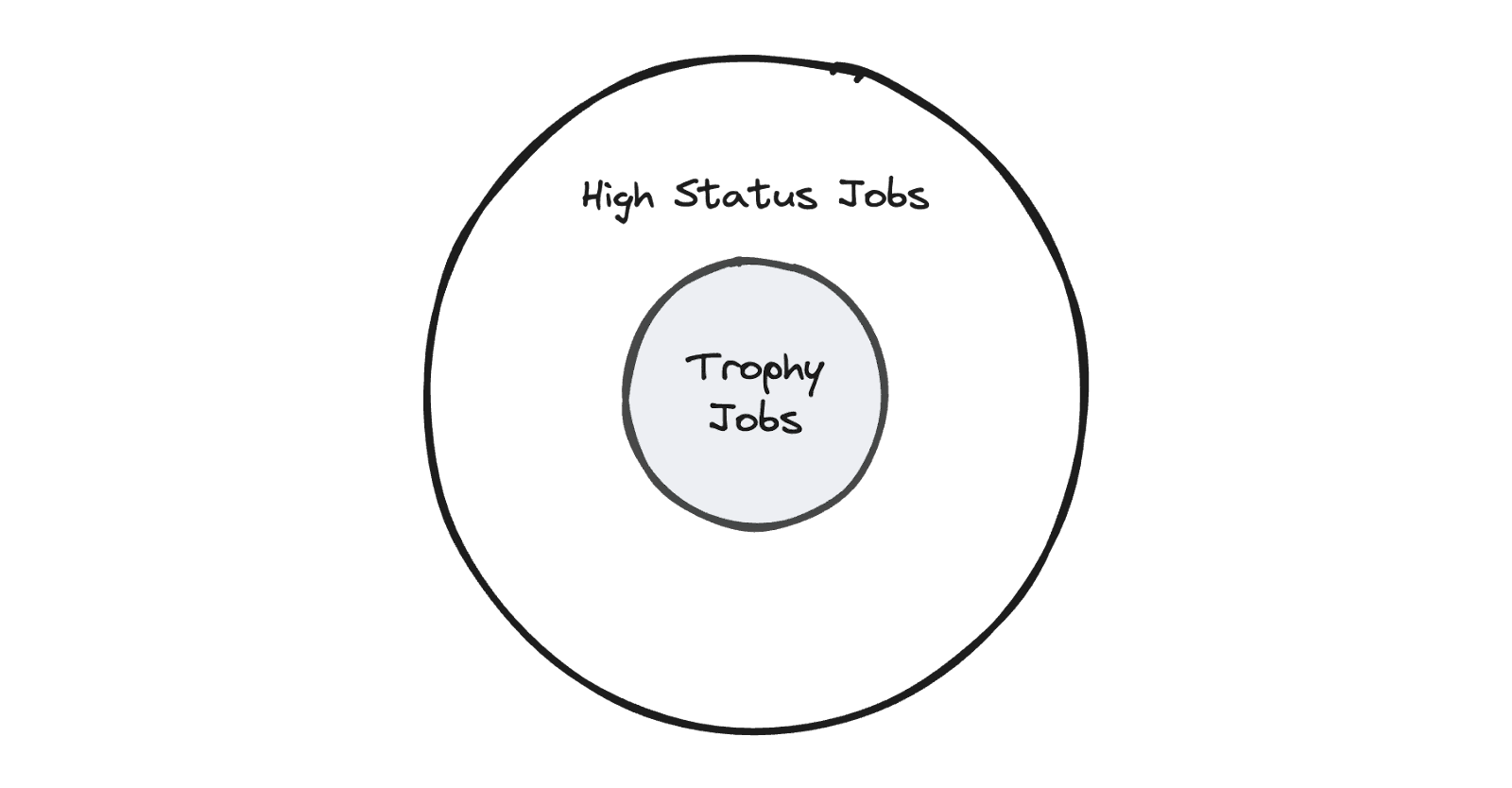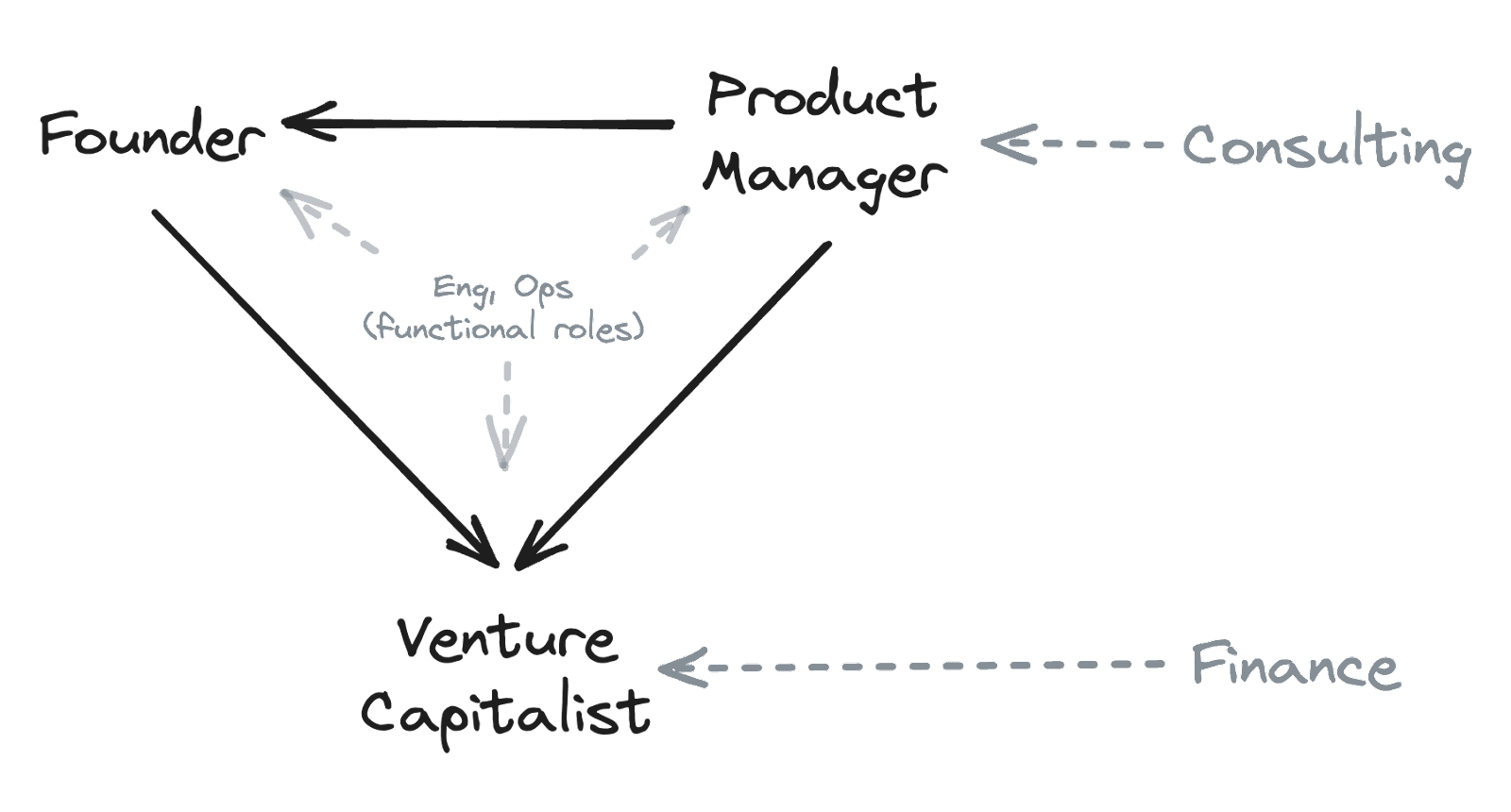Trophy Jobs
Work is a huge part of life. Why do we pursue what we pursue? I’ve been pondering how aspiration impacts us as individuals and even whole generations. I've seen it up close in many fields, most recently in tech.
We’ve all heard of the trophy wife or husband — a partner that’s valued heavily as a status symbol, for superficial qualities over substance. [1]
Similarly, I’ve started to think about the idea of the trophy job — a job that people covet for its status more than its substance.
Trophy jobs are more common than we like to admit. Chances are that you've sought after one before and you know many people who do.

How do you spot a trophy job?
Why do you or someone else covet a given job? It's helpful to break down the reasons and categorize them as status or susbtance.
Status is associated with things like brand, title, compensation, recognition, and power (often external or outputs-oriented).
Substance is associated with things like interest, curiosity, skill, experience, and community (moreso internal or inputs-oriented).
My rough heuristic for measuring this is the status-to-substance ratio:

A 1:2 ratio or smaller is safe (i.e. not a trophy job).
A 1:1 ratio is entering dangerous territory.
Anything greater, e.g. 2:1 ratio, is firmly in trophy job territory.
Sometimes it’s easier to spot a trophy job in retrospect. For example, when someone has a trophy job and its status drops, their desire to do it decreases a lot. It’s common for people to lose motivation when they’re unhappy with their job's substance, but with trophy jobs, satisfaction is tied most to status (e.g. of their role, the company, industry).

How do trophy jobs differ from high status jobs?
In short, all trophy jobs are high status jobs but not all high status jobs are trophy jobs. So high status jobs are prime candidates to be trophy jobs.

In math speak then, status markers are sensitive but not specific. Just because a job has a fancy title and high pay, it’s not de facto a trophy job.
Hence, consider two important things:
Whether something is a trophy job depends on a given individual’s motivation — whether their desire for its status overpowers substance.
Two people can hold the same job at the same company, yet for one person it could be a trophy job while for the other it is not.
This means it’s hard to truly prove or disprove that someone has a trophy job. (The same is true of a so-called trophy wife or husband, of course.)
Still, I suspect that most people have sought a trophy job at some point in their life – whether as a stepping stone for future opportunity or for its benefits today. Trophy job hunting seems increasingly common in this global, competitive, seemingly meritocractic, socially-mobile world.

There are trophy job targets in every field.
Ask any recent college graduate and they’ll tell you the most coveted jobs in each field and across all of them. They’ll also tell you how competitive it is to get one. These tend to be common targets for trophy jobs. [2]
For a while, the hottest job for ambitious new grads was management consulting. Finance jobs (investment banking, private equity) and prestigious professional degrees (MD, JD) also carried high status.
In the past decade, tech has risen up the career status ladder. Jobs at big tech companies and high growth startups have infiltrated the status game. Three roles form what I call tech's prestige job triangle: product manager (PM), venture capitalist (VC), and founder. [3]
Of the three, the founder role is unique because it's not a job you apply for. But, the Silicon Valley startup boom created an exception: venture capitalists effectively do hire founders. And being “vc-backed” comes not just with funding, but also a big status benefits package.

Trophy jobs feed into each other too. People move between the roles of PM, VC, and founder so often that it's become a trope. The "pipeline" is well-known: some go straight from a prestigious college into these roles, others come via legacy prestige jobs like consulting or finance, or via stints in functional roles (e.g. engineering, operations).
These jobs have become the latest consulting and banking of tech. Instead of seeking out a role at a McKinsey or Goldman Sachs, many new college grads chase one of these roles at a reputable startup or firm.
Talking to friends in the Silicon Valley ecosystem, the brutally honest takes come out: “I have so many trophy hunters in my network. I see kids saying they wanna be PMs, but it’s a pure prestige thing, they don’t even know what product is.” [4]

Companies enable trophy jobs too.
Companies play status games too when they seek people out for roles where a primary goal is internal or external status signaling. They recruit people that already have status from other trophy jobs, past successes, big networks, etc. [5] These hires can be very competent, yes, but they’re also valued highly for their status windfall.
In VC, it’s common to see firms recruit ex-founders or employees of hot startups, people with big public brands, alumns of prestige colleges, or all of the above. Pragmatically this can help find and win deals. On the operating side, this shows up in executive hiring when a priority is to instill confidence internally and externally (for fundraising, hiring, and the like).
Sometimes, the “trophy” isn’t a specific role — it’s just working at a high-status company itself. Maybe it’s the hot company that leans into its own hype to help recruit (or can’t avoid it). If taken a bit too literally, this famous Sheryl Sandberg quote can be trophy job bait:
"When companies are growing quickly and they are having a lot of impact, careers take care of themselves. If you’re offered a seat on a rocket ship, don’t ask what seat. Just get on.”

Trophy jobs aren't trophies forever.
Status is a moving target. The millennial new-grad target for trophy jobs might have been consulting, banking, and medicine. The gen Z new-grad target might be tech prestige jobs. But the trophy jobs of tomorrow are TBD. What do you think the next-gen trophy jobs will be? Remote, digital, and part-time work trends will make this more interesting.
Status also decays much faster than substance. A trophy job confers maximum status when in the role. When someone leaves a trophy job, they leave lots of status benefits behind. Hence, loss aversion kicks in and there’s a desire to replace the current trophy job with another ASAP.

Trophy job hoppers try to trade "up" with each new job. Meanwhile they're unaware or willfully ignorant of the tradeoffs. Hence they can get trapped in status games without truly knowing if they’re on a path they want to be on. One of the worst possible outcomes is realizing this after the fact, maybe even at the end of a career.
In practice, people are usually jolted out of the trophy job hunt at some point — either by a really bad experience in one, or a really great or eye-opening experience outside one. And to be fair, there's arguably a lot of good that can come out of a short-term trophy job. Some people even build successful careers doing this long-term, though I'd say it's a dangerous game.
A while ago I threw out the idea of minimum viable prestige — people want to accumulate a threshold level of prestige before they feel comfortable no longer playing status games to the same degree. This could be going to X school, getting Y degrees, or having Z job. I think early career trophy jobs serve this purpose for many.

There's a trophy you should want.
This isn’t a moral proclamation against trophy jobs.
We all choose jobs based on a mix of status and substance. But, don't let status alone dominate the equation. And if you do take a trophy job, be aware of it — have you had one? Find people that will push your thinking on what you aspire to and why. Protect your future self from your present-day self.
Lest this read too much like a warning shot, let me talk about what I believe should guide you instead and why. It's something that connects status and substance in a marvelous way: greatness.
Becoming truly great at something is an expression of deep substance. And it turns out that becoming truly great at something is also the best way to get status. [6] Said another way — no amount of status can get you substance, but substance can get you status. So ultimately, becoming great at something is the only trophy you should want.

If this working theory resonates, please consider sharing it with a friend (or on socials) & subscribe to my newsletter below. 🙏
Thank you to Andrew Rea, Bhaumik Patel, Parth Patil, my sister, and my mom for feedback on drafts of this post, and to Bharat Kilaru for our many great ideological debates on this topic.
Footnotes
[1] The term is considered disparaging, though that’s not my intention here. Rather, I see it as a simple way to communicate disproportionate value assigned to status.
[2] Trophy hunting starts even before you have formal “jobs.” Much of the resume-building in secondary education in anticipation of college education and beyond isn’t rooted in substance.
[3] I’ll throw in honorable mentions for Chief of Staff (COS) and Business Operations (Biz Ops) roles. I’d categorize these as more niche jobs that aren’t directly in the “pipeline.” There are also functional roles focused on people management or external comms that many describe as trophy jobs. They tend to come a bit later in career (e.g. with experience or post-MBA) and are perhaps common in mature startups or big tech.
[4] Thanks to my friend and former colleague, Parth Patil, for sharing his candid thoughts on aspiration and trophy jobs in tech.
[5] Since status isn't explicitly discussed by either side in the hiring process, it's hard to evaluate expectation mismatches upfront. Someone looking for a status-dominant job isn’t a good fit for a substance-dominant role, and vice versa.
[6] To become truly great at something, you need to be at least a little obsessed with that thing — enough to get lost in the joy of doing it, not the allure of what it could get you.
